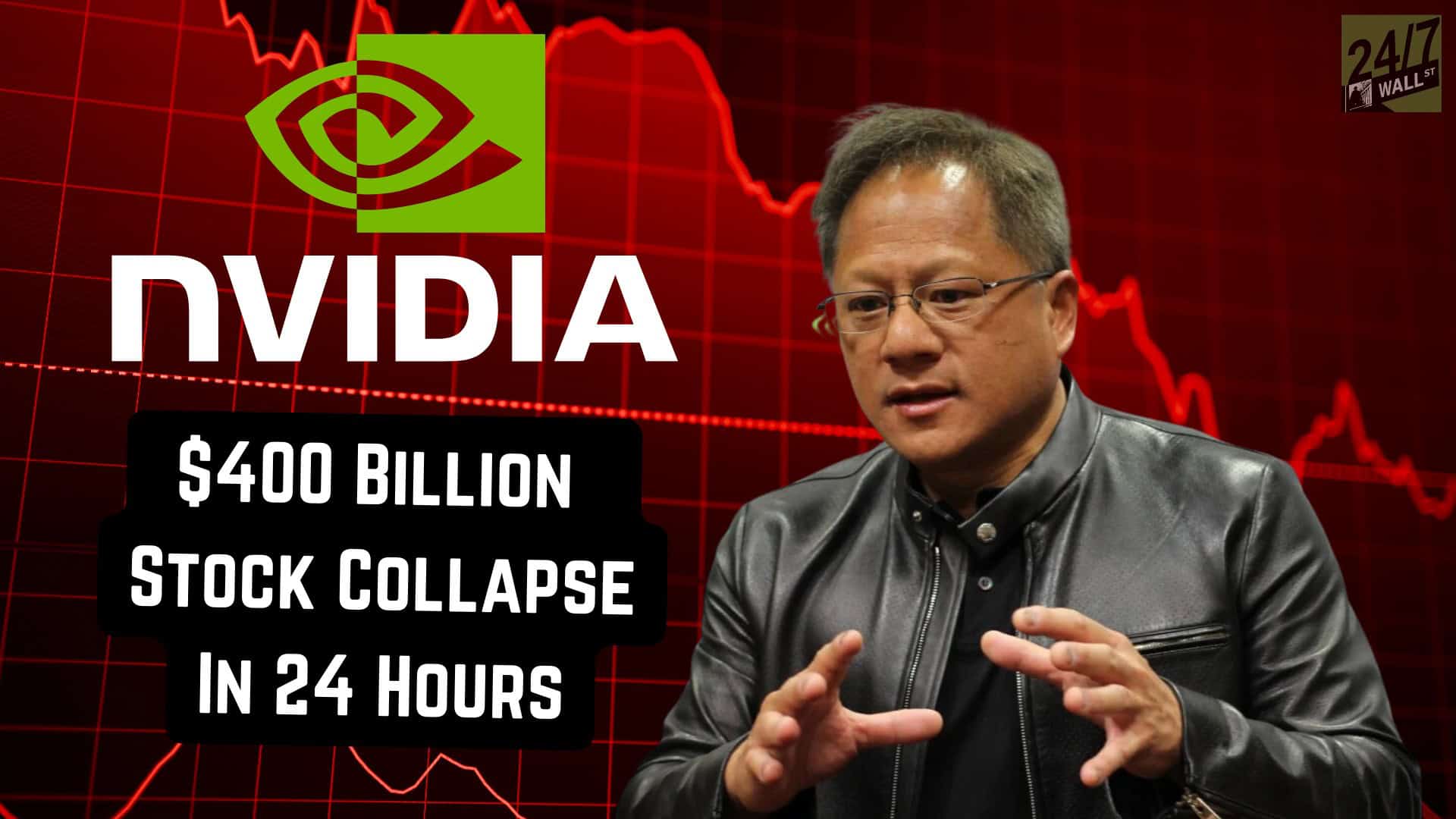Investing
NVIDIA’s Stock Price Plunges: What Caused NVIDIA’s $400 Billion Sell-Off

Published:

On Thursday, NVIDIA (Nasdaq: NVDA) hit a high of $140.76 per share. By Friday, its shares had sunk as low as $124.30 per share. Believe it or not, that drop shaved about $405 billion off NVIDIA’s market capitalization in less than 10 hours of trading!
Discover what caused NVIDIA’s $400 Billion sell-off and whether it spells long-term trouble for owners of the stock.
Below you’ll find some highlights from the discussion between 24/7 Wall Street Analysts Austin Smith and Eric Bleeker.
Eric, NVIDIA, after cresting higher than $140 per share recently, has suddenly nosedived.
So from their peak on Thursday to close, the company lost almost $277 billion in market value.
And that’s more than the total value of stocks like Qualcomm, Salesforce, Adobe, Pepsi, T-Mobile, Wells Fargo, you get the idea.
In a matter of hours, the company lost the market cap of some incredibly impressive companies.
And the selling on Friday morning pushed the market loss past $400 billion.
So Eric, what has caused this sudden reversal? What is going on? NVIDIA has been a stock that only goes up. How could it erase $400 billion in one week?
Yeah, you know, sometimes, you know, all those companies, it really does highlight the value that’s changing on an almost daily basis because you become almost desensitized to it.
But let’s put it in numbers because NVIDIA was trading for $94.95 before it announced earnings on May 22nd.
At its peak on Thursday, it had jumped just under 50% in a month. That’s simply unprecedented for a company in size, full stop.
We’ve never seen anything like this. And there’s been signs that the main stock was reaching what you could call kind of irrational levels.
On Wednesday, markets were closed, and NVIDIA still jumped 4% in overseas trading in markets like Frankfurt. That was eyebrow-raising.
Also, its volume has reached historic numbers. This is in total shares traded on Thursday.
NVIDIA’s volume was 230 times higher than Netflix, nine times higher than Tesla, seven times higher than Apple, 36 times higher than Microsoft, 35 times higher than Google, 14 times higher than Amazon, 60 times higher than Facebook.
None of those numbers are typos. This is just the incredible amount of volume trading place right now.
So does this mean investors in NVIDIA should hit the exits? I don’t think so because there’s going to be bumps along the way in stocks and that’s healthy.
It’s healthy for stocks not to go up every single day. And the biggest risk to NVIDIA is a decrease in AI hardware spend which looks no more likely within the next 18 months than it did a week ago.
So Austin, I’ve published several articles on 24/7. People could search my name. It’s at the bottom right there. I’ve put my numbers, why I think NVIDIA, will hit $150 by the end of summer.
And it’s basically just keeping up with a forward PE that’s on the same level as its magnificent seven peers.
So if you’re an investor out there, I’ll be watching the sell-off and if it continues.
Another thing you can do is keep some high-quality names in the AI space or on your radar.
I’ve talked a lot about companies like Broadcom. That’s a potential alternative.
I’ve explained why it’s essentially the Windows approach to NVIDIA’s Apple approach to the AI data center. You could look at that, but you could also look at some more infrastructure names.
I’ve seen some sell-off happening in names like ASML or Lam Research, but not quite as sexy. But these are strong names that deliver compelling returns on capital for years.
So regardless, the bottom line is I don’t think NVIDIA sell-off is related to any news that’s happened in the past 24 hours. It’s simply the other side of the momentum investors have seen across the past month.
And I’m not changing my projection that I do believe NVIDIA will hit $150 by the end of summer.
Yeah, this is really fantastic guidance. And while it’s an eye-popping number to lose $400 billion in market cap so swiftly, we need to remind ourselves that NVIDIA had to grow at absolutely meteoric levels to afford to lose that amount in the first place.
This is really a reflection of just how big the company has gotten and taken in the context of the company’s overall story and their overall position in the AI space. I mean…
Is it safe to say this is largely just noise and the number is so big because now NVIDIA itself is so big and the company still appears well-positioned today?
Yeah, I would definitely say that’s exactly what we’re watching play out, Austin.
Thank you for reading! Have some feedback for us?
Contact the 24/7 Wall St. editorial team.